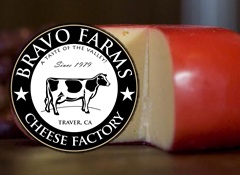I’d never heard of Fairway cause I’m not much of a New Yorker, but it is apparently “one of Manhattan’s culinary meccas.”
Coincidentally, a barfblog.com reader e-mailed to say she was “shopping at her local Fairway and noticed a sign lauding both the flavor and the safety of raw milk cheese — also trashing pasteurization a little. I spoke to the cheese supervisor about the danger of misleading people and he was quite pleasant about it, considering.”
I don’t have a picture of the sign, nor access to a local Fairway (in Manhattan, Kansas) but the stagecoach has been delivering fancier cheeses to some of the bigger retailers in the area, so I went out to ask a few questions.
This matters because, as the U.S. Centers for Disease Control reported last week, the number of people sick with E. coli O157:H7 from consuming Bravo Farms Dutch Style Gouda Cheese – made from unpasteurized milk and offered through a Costco cheese sampler in several states—has risen to 37, including 15 hospitalizations.
As part of the investigation, the U.S. Food and Drug Administration sampled other cheeses sold through Costco and found a different strain of E. coli O157:H7 in an unopened package of Mauri Gorgonzola cheese. No one’s sick that anyone knows of from this cheese, but bugs can be anywehere.
So what’s a shopper to do?
Contamination with dangerous microorganisms, especially listeria and E. coli O157:H7, can happen in cheese in made from raw or pasteurized milk. Based on consumption levels, I’m guessing there’s a higher level of outbreaks in cheese made from raw milk, but that would require a lot of analysis on consumption data. Regardless, it was enough for two of France’s top lait cru Camembert producers, Lactalis and Isigny-Sainte-Mère, to announce in June 2007 they were switching to cheese made exclusively with heat-treated micro-filtered milk (not quite pasteurized but still an affront to purists).
At the time, Lactilis’ spokesperson, Luc Morelon said, “I don’t want to risk sending any more children to hospital. It’s as simple as that."
Cheese made from raw milk – domestic and imported – is available in the U.S., including supermarkets in Manhattan (Kansas), but FDA stipulates such cheese must be  aged for at least 60 days. The idea is acid and salt help destroy dangerous bugs.
aged for at least 60 days. The idea is acid and salt help destroy dangerous bugs.
But even the 60-day rule has come under question.
In July, 2008, Mansel Griffith of the University of Guelph, one of several experts who reviewed the status of raw milk cheese for the Canadian province of Quebec, told the Globe and Mail the 60-day limit had become arbitrary, since it is no longer a guarantee of destroying pathogens. Still, he believes raw-milk cheese continues to pose health-safety issues over potential pathogens.
John Sheehan, director of FDA’s division of plant and dairy food safety, told the N.Y. Times a year ago the 60-day aging requirement is no longer thought to be effective, and is currently under review.
Today I found out several raw milk cheeses were available at the local supermarket, but take a magnifying glass: I know I’m getting old, but even with my reading glasses I could barely make out the ingredients contained raw milk and that the cheese had been aged 60 days.
Some clarity would help.
